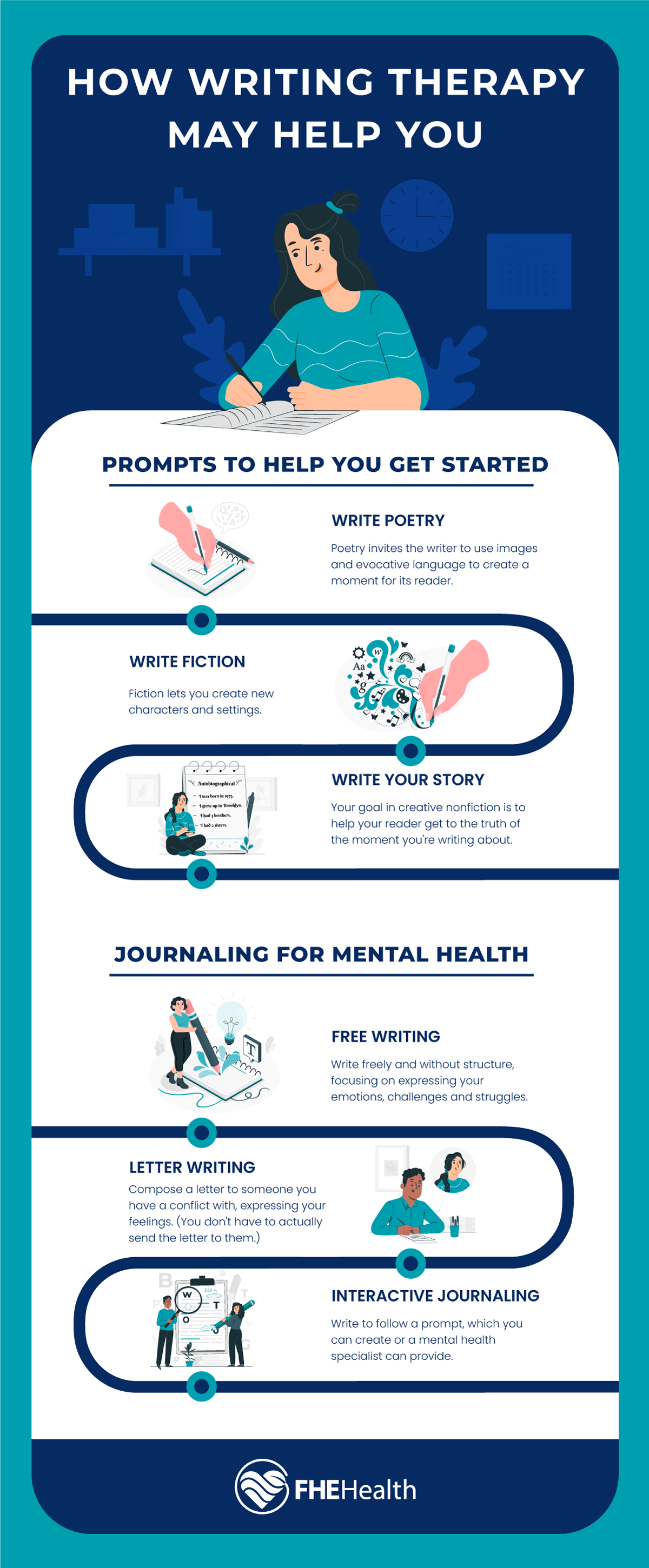
Writing can be an invaluable tool in your road to recovery after you’ve been through drug and alcohol detox treatments at a medical detox facility and addiction recovery center.
Writing therapy involves journaling thoughts and feelings to manage emotions and reduce stress. Also known as therapeutic or expressive writing, writing therapy allows people who are suppressing emotions or memories of traumatic events to recount them in order to heal. According to a 2019 study published in the journal Complementary Therapies in Clinical Practice, researchers found that a 6-week writing intervention program improved resilience and reduced symptoms of depression, stress and rumination. Learn more about the benefits of therapeutic writing and how you can use it to positively impact your mental health.
What Can Writing Offer You?
It may sound like work, but once you release your inhibitions and any negative associations about writing you may have picked up when writing research papers and book reports, writing can become your best friend. You’ll find that being able to put your thoughts down on paper can help you do some therapy work even without a therapist present.
A therapist can help you draw connections between different parts of your story. When you write your experiences and feelings down in a daily journal, you can more easily see and understand those connections and patterns. You may find you start to have more insight into the most productive way to manage your triggers as you write about the ways you currently manage them and the fallout from poor management or the successes as you refine your sober life.
Here Are 3 Ways to Start Writing
- Write poetry. Poetry invites the writer to use images and evocative language to create a moment for its reader. Because poetry is often shorter and more prescriptive than nonfiction, it can be an easier way to begin writing. Poetry often has guidelines to adhere to in haikus, sonnets or roundels. You can also write freestyle, without any constraint.
- Write fiction. Fiction lets you create new characters and settings. You can bend your imagination to your will as you shape full characters with goals and passions. You could even write about someone like you, recovering from drug and alcohol addiction, making the choice every day to live a healthy and sober life.
- Write your story. Creative nonfiction is the genre of writing that allows you to tell your own story. Your goal in creative nonfiction is to help your reader get to the truth of the moment you’re writing about. It isn’t about trying to squeeze out every last factual truth in your memory but to put every emotional fact down with the factual truths you can recall guiding that emotion. Remember that memory is always perspective-based and inherently flawed. Don’t stress about details like the color of a shirt, if the room was facing west or north or if the man in the photo was your father or your uncle. Go with what you feel most to be your truth. No one can do more. Writing your story can be one of the best ways to put the pieces back together.
How Writing Therapy May Help You
Writing therapy can assist individuals living with anxiety, depression, post-traumatic stress disorder and substance abuse. Expressive writing benefits include helping people heal from traumatic experiences. If you’re journaling about a conflict, writing therapy can help you find compassion for others or assist you with better understanding the situation. It can also help you discover new insights about yourself and your emotions.
How to Start Journaling for Mental Health
Writing as a therapeutic tool can be highly effective, whether you’re doing it on your own or under the guidance of a mental health professional. The key is to be consistent in your writing and use this technique often. Several types of writing therapy exist, including:
- Free writing. Free writing means putting your thoughts on paper. You can write freely and without structure, focusing on expressing your emotions, challenges and struggles. Free writing is an effective way to acknowledge and confront emotions and stresses.
- Letter writing. For individuals who are struggling due to a failed relationship or a conflict with a loved one, letter writing can be helpful. Compose a letter to this person expressing your feelings. You don’t have to send the letter — simply writing it can be a helpful way to work through the conflict.
- Interactive journaling. Interactive journaling involves writing to follow a prompt, which you can create or a mental health specialist can provide. These prompts can help you address how your experiences have impacted your current challenges and how you can move forward.
Discover Writing as a Therapeutic Tool
Writing can be a therapeutic tool as you work through powerful emotions and experiences. For additional support, don’t be afraid to ask for help. Contact FHE Health now for the mental health support you need.







